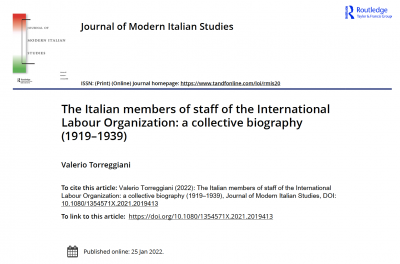This article investigates the relationships between Fascist Italy and the International Labour Organization (ILO) during the interwar period, focusing on the Italian personnel of the ILO. It applies a prosopographical approach to mapping out the composition and development of the Italian community working at the ILO, exploring its social, cultural, and political characteristics and career trajectories. Three key findings emerge from this article. First of all, it is the first study of the gender, age, socio-economic, political, educational and professional backgrounds of the Italian civil servants employed at the ILO between 1919 and 1939. Second, the article illustrates how the Italian community of the ILO was far from being a static and homogeneous group; on the contrary, and especially if observed from a political perspective, the Italians were profoundly divided, mirroring the polarized political situation of their country. Third, my analysis demonstrates the value assigned to the daily work of the ILO by Fascist authorities, both in relation to the international diplomatic game and to the importance of counterbalancing the anti-fascist forces at work in the ILO. Finally, on a methodological level, the article offers an example of how prosopographical analysis, hybridized with a more narrative and biographical approach, can be used to study international organizations and their complex relationships both with their member states and with the general political context.

Authors

